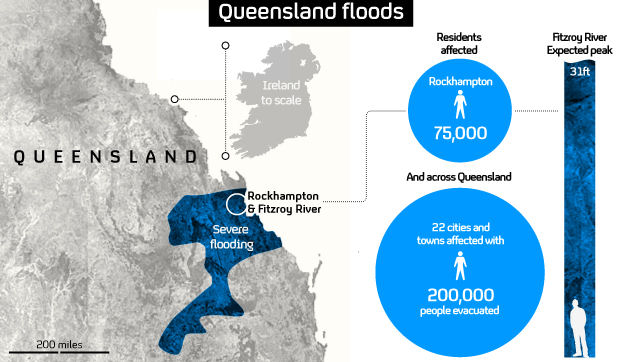Australia floods: water levels to rise
People in flood-hit parts of Australia are preparing for a further rise in water levels. Police are warning residents that deadly snakes and crocodiles lurking in the water may also pose a danger.
The city of Rockhampton, 370 miles north of Brisbane, is now accessible mainly by emergency boats.
The latest floods in Australia are some of the worst to affect the country in decades.
Water levels are continuing to rise in Rockhampton and are expected to peak sometime late on Tuesday or Wednesday.
Police have cordoned off large swathes of land in a bid to keep people safe.
There are fears that snakes and crocodiles could pose a danger to locals.
We will have significant water inundation for the best part of nearly two weeks. Brad Carter, Rockhampton Mayor
The Mayor of Rockhampton, Brad Carter, warned people the flood water would continue to cause problems for some time: “There is a suggestion that this may remain at the peak, whatever that peak is, for a period of up to two days.
“Then as it starts to drop and flatten out, it’s likely to be about ten days or so that it could stay at the, or up to ten days, at about the 8.5 metre mark, which indicates that we will have significant water inundation for the best part of nearly up to another two weeks.”
Rockhampton is the latest of 22 towns and cities to be affected by the severe flooding which started just before Christmas.

A military cargo plane carrying food, water and medical supplies landed north of Rockhampton yesterday.
The goods will be trucked south or carried on barges.
“In that aircraft, there are basic and essential supplies including toilet paper, nappies, baby formula and milk powder and the like. And that will continue on for the next two days”, said Luke Foster from the Australian Defence Force.

Economic cost
It’s estimated the flooding has cost Australia A$1bn.
Queensland’s interior, normally a vast outback of cattle properties, farms and mines, is now an inland sea, dotted with the roofs of flooded homes and islands with stranded livestock.
The floods have hit commodity exports that are a mainstay of the Australian economy.
The rising waters have closed coal mines, paralysed the transport of goods and added to the already heavy toll the wettest spring on record has taken on eastern Australia’s commodities sector.